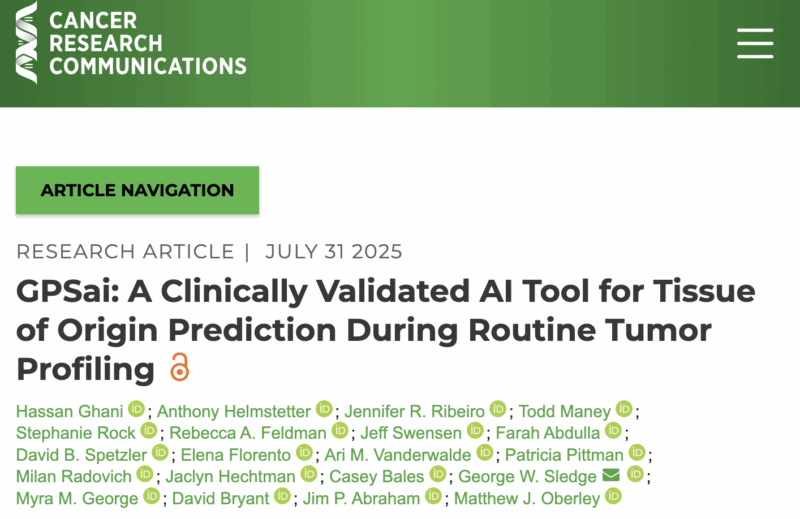
Matthew Oberley: GPSai AI Tool Has Been Validated on 100K+ Tumor Cases for CUP Diagnosis
Matthew Oberley, Chief Clinical Officer at Caris Life Sciences, shared a post on LinkedIn about a paper he co-authored with colleagues published in Cancer Research Communications:
“Thrilled to announce the publication of our manuscript detailing the development and validation of GPSai, Caris Life Sciences’ AI diagnostic tool for cancer of unknown primary (CUP) diagnosis!
This was a monumental team effort at Caris, led by myself, George Sledge, and inventors Hassan Ghani and Anthony Helmstetter, and it’s already making a significant impact since its early 2024 launch. This version of GPSai builds on key earlier work by Jim Abraham and David Spetzler.
Our GPSai model is a deep learning-based tool trained on a massive dataset of 201,612 tumor cases, using whole exome sequencing (WES) and whole transcriptome sequencing (WTS) data as a feature set.
The model employs twenty distinct neural networks, hierarchically classifying tumors into 26 major cancer categories and 64 more granular subcategories. The giant size of the training and validation set helped us avoid overfitting.
GPSai’s effectiveness has become clear: 95.0% accuracy in non-CUP cases and an 84.0% call rate in CUP cases. This strong performance held true across retrospective and prospective validations, even in metastatic tissue.
Our external validation using data from The Cancer Genome Atlas (TCGA) data further confirmed its effectiveness, showing 97.9% overall concordance and a 98.6% call rate.
Overall, we validated GPSai on 104,640 cases when combining retrospective, prospective, and external datasets.
A key advantage of GPSai is its seamless integration into routine molecular profiling at Caris. It runs as an AI algorithm on existing WES/WTS data, incurring no additional cost, specimen requirement, or turnaround time.
We even run it in the background as a quality check; if GPSai’s prediction doesn’t match the submitted pathologist report, our team investigates. This ‘physician-in-the-loop’ approach has driven significant real-world impact: in its first eight months, GPSai prompted diagnosis changes in 704 patients.
These changes led to altered therapy eligibility based on Level 1 clinical evidence in 86.1% of those cases.
What’s next? We’re actively exploring the application of GPSai to remnant CUP clinical trial specimens to demonstrate improved outcomes when treatment aligns with GPSai predictions.
These studies are currently underway. Much thanks to the entire pathologist group (30+) at Caris who actively manage this tool to optimize outcomes.”
Title: GPSai: A Clinically Validated AI Tool for Tissue of Origin Prediction During Routine Tumor Profiling
Authors: Hassan Ghani, Anthony Helmstetter, Jennifer Ribeiro, Todd Maney, Stephanie Rock, Rebecca Feldman, Jeff Swensen, Farah Abdulla, David Spetzler, Elena Florento, Ari Vanderwalde, Patricia Pittman, Milan Radovich, Jaclyn Hechtman, Casey Bales, George Sledge, Myra George, David Bryant, Jim Abraham, Matthew Oberley.
Read the Full Article in Cancer Research Communications.

More posts featuring Matthew Oberley on OncoDaily.
-
Challenging the Status Quo in Colorectal Cancer 2024
December 6-8, 2024
-
ESMO 2024 Congress
September 13-17, 2024
-
ASCO Annual Meeting
May 30 - June 4, 2024
-
Yvonne Award 2024
May 31, 2024
-
OncoThon 2024, Online
Feb. 15, 2024
-
Global Summit on War & Cancer 2023, Online
Dec. 14-16, 2023
